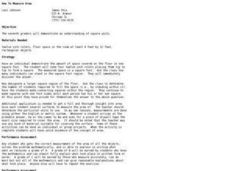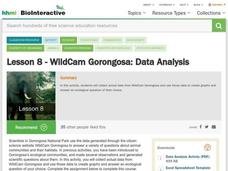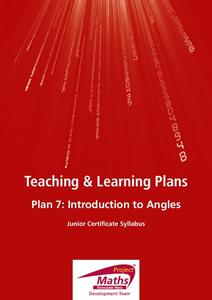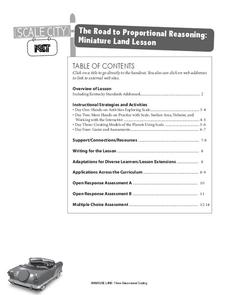Curated OER
Asking For Directions
In this asking questions worksheet, students solve a word problem involving asking the minimum number of questions for directions. Students complete 1 complicated higher order thinking problem.
College Board
Teaching Students How to Write AP Statistics Exam Responses
But this is math—we don't need to know how to write! The article makes a point that class members in AP® Statistics should be comfortable writing as the exams require it. Individuals quickly realize that quality writing is crucial...
Curated OER
Narrow It Down
Ever played 20 Questions? A similar game helps young learners practice asking and answering yes-or-no questions. Spread out several objects, preferably all similar with slight variations (buttons or coins would work well). A leader...
New York City Department of Education
Project Based Learning
After reviewing the information included in this resource, you will be an expert in both the definition of project-based learning and how to implement it with your class. Discover and explore thorough explanations, detailed...
Curated OER
How To Measure Area
Geometers learn how to measure the area in square units. They use the floor in the classroom as a visual to measure a square foot area. They use classmates to fill the space and expand the measured area square foot by square foot until...
EngageNY
TASC Transition Curriculum: Workshop 8
Lights, camera, action! Math educators consider how to improve their instruction by examining a model of the five-practice problem-solving model involving a movie theater. Participants examine cognitive demand in relation to problem...
Illustrative Mathematics
Running to School, Variation 2
Rose's commute to school is a fractional distance. After she runs part of the way, your class needs to determine what fractional distance she ran. This problem explores fraction operations through modeling and computation. The...
Arizona Department of Education
Introduction to Integers
Welcome to the backward world of negative numbers. This introductory lesson teaches young mathematicians that negative numbers are simply the opposite of positive numbers as they use number lines to plot and compare...
College Board
2015 AP® Calculus BC Free-Response Questions
How will the exam ask this question? The free-response questions from the 2015 AP Calculus BC exam demonstrate how questions appear on the test. Using the questions, pupils gain experience answering similar inquiries to what they see on...
EngageNY
Word Problems Leading to Rational Equations
Show learners how to apply rational equations to the real world. Learners solve problems such as those involving averages and dilution. They write equations to model the situation and then solve them to answer the question —...
Howard Hughes Medical Institute
Lesson 8: WildCam Gorongosa Data Analysis
How do scientists analyze data to get a specific answer to a question? The final chapter in an eight-part series of activities centered around Gorongosa National Park encourages scholars to dig deeper into the scientific process. After...
CK-12 Foundation
Fractions as Percents: Baking Cookies
A five-question interactive challenges mathematicians to solve word problems involving fractions as percents. Baking two different types of cookies and needing the exact amount requires scholars to make fractions, turn them into...
Project Maths
Introduction to Angles
Approach the lesson from the right angle. A discussion-based lesson leads helps learners understand angles in terms of rotation. Individuals use manipulatives to explore the properties of angles and learn how to name them. The lesson is...
Balanced Assessment
Lotto
You can't win if you don't play! Find out how to increase your chances of winning the lottery. Scholars analyze a state lottery system for the probability of winning. They also consider different combinations of numbers and how they...
Kentucky Educational Television
The Road to Proportional Reasoning
Just how big would it really be? Young mathematicians determine if different toys are proportional and if their scale is accurate. They solve problems relating scale along with volume and surface area using manipulatives. The...
CK-12 Foundation
Values Written as Powers: Binary Numbers 1 to 8
A six-question interactive tasks scholars with adding binary numbers one through eight. A tool acts as a visual aid to showcase the patterns made when working with base—2, digits zero and one. Question types include fill in the blank,...
Illustrative Mathematics
How Long
It won't take young mathematicians long to learn how to measure length with this fun, hands-on activity. Working in pairs, children use Unifix® or snap cubes to measure and record the lengths of different classroom objects. To extend the...
Project Maths
Introduction to Trigonometry
The topic of trigonometric ratios is often covered with loads of rote memorization baked into the activity. This activity set, however, leans more on using similar triangles and discovery learning to help young geometers develop a deeper...
Visa
Money Matters: Why It Pays to Be Financially Responsible
What does it mean to be financially responsible? Pupils begin to develop the building blocks of strong financial decision making by reviewing how their past purchases are examples of cost comparing, cost-benefit analysis, and budgeting.
College Board
2005 AP® Calculus BC Free-Response Questions
Differentiate between the exams. Using the Q&A document, teachers compare the free-response questions that BC test-takers see to those that AB test-takers see. The pupils see which questions come from AB content and also those that...
Illustrative Mathematics
Buttons: Statistical Questions
Here is a nice activity about recognizing the difference between a statistical question and answer and one that anticipates a fixed answer. From this, your future statisticians will develop an understanding of variability and be able to...
California Education Partners
Yum Yum Cereal
Design an efficient cereal box. Scholars use set volume criteria to design a cereal box by applying their knowledge of surface area to determine the cost to create the box. They then determine whether their designs will fit on...
EngageNY
When Can We Reverse a Transformation? 1
Wait, let's start over — teach your class how to return to the beginning. The first lesson looking at inverse matrices introduces the concept of being able to undo a matrix transformation. Learners work with matrices with a determinant...
Curated OER
The First Strawberries
Young scholars explore Cherokee legends. They read The First Strawberries by Joseph Bruchac, and then do several activities to help comprehension. They discuss the book and answer comprehension questions. In addition, they retell the...























